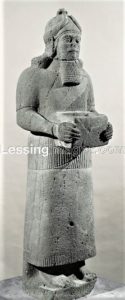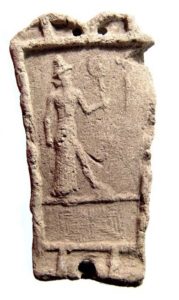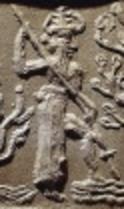(Texts: All Artifacts, Color Coding, & Writings in Bold Type With Italics Inside Parenthesis, are Added by Editor R. Brown, not the Authors, Translators, or Publishers!)
(gods in blue …mixed-breed demigods in teal...)
[For the god …] … venerable, splendid, the god Mudugas (unidentified),
exalted, sovereign,[spouse of] the goddess Ninsiga (unidentified) —
(most) honoured of (all) goddesses, mistress of (all) the inhabited world, majestic, goddess of absolutely everything —
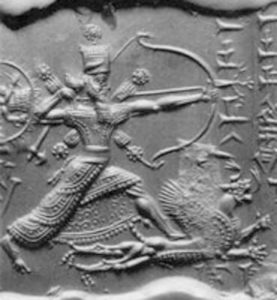 (Ninurta, warrior son to Enlil)
(Ninurta, warrior son to Enlil)
the god [Ut]ulu (Ninurta), the powerful lord who marches in front of all the gods,
perfect […] of the gods, resplendent, beloved of the god Ninšiku (Ea) (Enki), (i 5)
[endowed with] wisdom and insight, who evaluates omens, […] of kingship,
the one who directs everything, who grants sceptre, throne, reign, (and) royal crown,
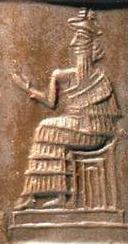 (Enlil)
(Enlil)
perfect [offspring] of the god Nunamnir (Enlil), honoured son, offspring of the princess of the gods, the goddess Erua,
[…] of Esagila, lord of everything, victorious, beloved of the god Marduk,
[… of the god As]ari (Ashur), eldest son (of Marduk), foremost, the one who goes in front,
the one who […] with the father who begat him … (i 10) […] judge of the gods, king of the great gods,
the one who is res[plendent] in the east and in the west, [… of the go]ds, his own counsellor,
the one who accepts entreaties (and) hearkens to supplications, one who has broad under[standing, …,
the one to whose] venerable command the Igīgū (Igigi) gods submit themselves humbly
(and) the Anunnakū (Anunnaki) gods [… clad in] a holy awe-inspiring sheen,
garbed in terrifying splendour, filled with fearfulness, […] established judgment
and the Sibitti gods do not [… (i 15) …, the one who has] work songs [su]ng in the land,
the one who begot … […] … who establishes plenty, abundance, and wealth for […]
… the great gods […] who makes prosper […] is not equalled […] … […]
… […] to administer the people correctly […] to Borsippa […] he proceeds along the road […] (i 5′)
this storehouse […] a praiseworthy structure … […]
of this storehouse in [… which] had buckled and become weak […] … […]
which from time immemorial, from long before me,
no governor (or) commissioner of B[orsippa] (i 10′) had done,
he charged me with this work and entrusted (it) to me —
me, Nabû-šuma-imbi, son of Ēda-ē[ṭir], nešakku-official,
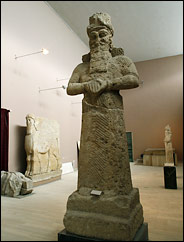 (giant god Nabu, statue now destroyed by radical Islam)
(giant god Nabu, statue now destroyed by radical Islam)
one privileged to enter the temple of the god Nabû (Marduk’s 3rd son),
governor of Borsippa, slave who reveres his great godhead (and) stands in service before him,
prayerful soldier who constantly pays attention to the cult of the god Nabû, lord of the lands (and) lord of the gods.
I began that work and ordered that it be done.
Disorders, disturbances, revolt, and turmoil occurred in Borsippa, the city of truth and justice.
During the reign of king Nabû-šuma-iškun, the Dakkurian, the Babylonians, the Borsippians,
(the people of) the town Dutēti (which is on) the bank of the Euphrates,
all the Chaldeans, Arameans, (and) the people of Dilbat sharpened their weapons
for many days (to fight) with one another (and) slew one another.
Moreover, they fought with the Borsippians over their fields.
[…] … Nabû-šuma-iddin, son of Aqar-Nabû, one privileged (mixed-breed) to enter the temple of the god Nabû,
the chief administrator of Ezida […]… by himself
he set against/concerning Nabû-šuma-imbi, son of Ēda-ēṭir, governor of Borsippa. (ii i)
By night, like thieves, the enemy, the foreigner, fug[itives, …], wicked enemies, with stopped ears,
who would not listen to me, per[verse, (…)] I returned […] to Ezida,
and Ezida and Borsippa […] they seized and set up a hue and cr[y] over the city and temple, (ii 5) as they fought.
On this night, the Borsippians and the people of […], who were present to help one another,
surrounded the house of Nabû-šuma-[imbi, son of Ēda-ēṭir], governor of Borsippa and with arrows
and [… From evening] until sunrise they raised battle-crys.
From eve[ning] until sunrise Nabû-šuma-imbi, son of Ēda-ēṭir, governor of Bors[ippa …]… prayed,
“Nabû, my … are no more!” […] … […]
[…] their […] … […] burnt […] plenty, and to [… (ii 5′) …] … the storehouse […]
Nabû-šuma-imbi, son of Ēda-ēṭir, governor [of Borsippa …] who reveres him
(and) stands in service bef[ore him …] his great [godhead], let them speak […] let him agree!
[Let him be]stow on him [as a gift] and [grant him] as a present peace (and) good […]!
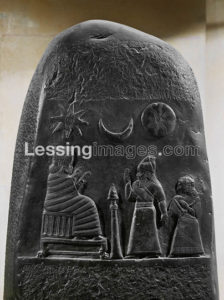 (Nanaya & Babylonian king)
(Nanaya & Babylonian king)
[May the goddess Nanāia (Nanaya, Nabu’s spouse)], … mistress of (all) the goddesses […],
the compassionate goddess, creat[or of …], whose word is favourable,
[whose] utte[rance cannot be changed, whose] command cannot be altered […],
intercede [for me] daily (ii 15′) in the presence of [the god Nabû] …
who makes decisions for heaven and [netherworld …], the son of the Enlil [of the gods (Marduk)]!
May I increase [(my) good fortune]! […] distant days, year[s …], life of shining […] as a gift […] offspring,
may [...] progeny […] in the palace […] may her word be favourable! […]
May [his position as] shepherd be confirmed with (regard to) Ez[ida and] Borsippa! […]
May his [words] be pleasing unto the king of the gods, the lord of lords! […] way [… Ezida] and Borsippa
in the presence of the god Nabû and the goddess Nanāia, the supreme gods […]
May he experience the fullness of old [age]!
In strife, war, fierce battle, and camp[aigning, …] (ii 25′) he, [his] offspring, his […] to go to his aid,
to overthrow […] may he fill his hands with plenty [… (and)] great abundance!
At […] and at … of the god Erra (Nergal), the raging one, beloved son of the god Enlil, the pow[erful …]
May dagger (and) pla[gue] never draw near him!
May peace be established for him! […] to extinguish his wicked enemies like embers!
[May he praise] your (Nabû and Nanāia’s) godhead and [your] greatness (ii 30′) for (all) future generations!
May you, lord, be his help […]
Call him [so that he may sing of your] fame for future days!
O god Na[bû accept] the prayers and supplications of Nabû-šuma-imbi, governor of Borsippa!
Inscription dealing with the storehouse, from the enclosure wall of Ezida.
